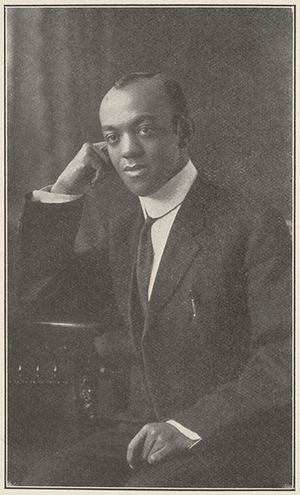Fenton Johnson (poet) facts for kids
Quick facts for kids
Fenton Johnson
|
|
|---|---|

Portrait of Fenton Johnson published in Visions of the Dusk (1915)
|
|
| Born | May 7, 1888 Chicago, Illinois |
| Died | September 17, 1958 (aged 70) Chicago, Illinois |
| Language | English |
| Alma mater | Northwestern University University of Chicago Columbia University |
| Genre | Poetry |
Fenton Johnson (born May 7, 1888 – died September 17, 1958) was an American poet, writer, and editor. He also taught English for a time. Johnson grew up in Chicago, Illinois, where he spent most of his life.
He is known for his unique style of writing, especially his early prose poetry. This is poetry written in sentences and paragraphs, not in traditional lines. Many of his works are found in collections of 20th-century poetry. Another famous writer, James Weldon Johnson, called Fenton "one of the first Negro revolutionary poets." Fenton Johnson is also seen as a key figure who helped pave the way for the Harlem Renaissance. This was a time when African-American art and culture flourished.
Contents
Early Life and Education
Fenton Johnson was born in Chicago, Illinois, on May 7, 1888. His parents were Elijah and Jesse Johnson. His father worked for the railroad, and their family was quite well-off. They even owned the building where they lived.
Young Fenton was described as a "dapper boy." He even drove his own electric car around Chicago! From a young age, he loved to write. He once said he had been "scribbling since the age of nine." Even with his love for writing, Fenton first wanted to become a member of the clergy.
School Days
Johnson went to several public schools in Chicago. These included Englewood High School and Wendell Phillips High School. After high school, he attended Northwestern University from 1908 to 1909. He then earned a degree from the University of Chicago. Later, he studied at the Columbia University Pulitzer School of Journalism.
First Jobs
After finishing school, Fenton worked as a messenger and in the post office. Then, he became an English teacher. He taught at the State University of Louisville (SUL) in Kentucky. This was a private college for Black students. He taught there from 1910 to 1911. In 1911, he moved back to Chicago to focus on his writing career.
A Career in Writing
In 1913, Fenton Johnson published his first book of poems. It was called A Little Dreaming. He paid for this book himself, and he did the same for his next two collections. These were Visions of the Dusk (1915) and Songs of the Soil (1916).
Around 1909, Johnson wrote a story called "A Wild Plaint." It was like a diary from a character named Aubrey Gray. This story showed how difficult it was to face unfair treatment. The character felt many emotions, from hope to anger and sadness. The story highlighted the struggles caused by prejudice.
Moving to New York and Back
Between his first and second poetry books, Johnson moved to New York. He studied at the Pulitzer School of Journalism. Someone helped him with money so he could attend. After his third book of poetry, Johnson returned to Chicago.
In 1916, he helped start a magazine called The Champion. His cousin, Henry Bing Dismond, was also involved. Henry was a poet and a popular athlete. The Champion focused on celebrating the achievements of Black people. It was published every month. Two years later, in 1918, Johnson and Dismond started another magazine. It was called The Favorite Magazine, and its slogan was "The World’s Greatest Monthly."
Publishing His Works
The Favorite Magazine published some of Johnson's poems. His short stories also appeared in The Crisis magazine. In 1920, he published his own collection of short stories. It was titled Tales of Darkest America. That same year, he released a book of essays called For the Highest Good.
During this time, from about 1912 to 1925, Johnson made important connections in Chicago. He worked with Harriet Monroe, who ran Poetry magazine. Several of his poems were published there. He also appeared in an anthology called Others: A Magazine of the New Verse in 1915. One of his most famous poems, "Tired," was published in 1919. It also appeared in The Book of American Negro Poetry in 1922. Johnson also worked on a fourth poetry collection, African Nights, but it was never published.
Plays and Other Writings
Besides poetry and editing, Johnson also wrote plays. By the time he was 19, his plays were performed. They were shown at the old Pekin Theatre in Chicago. In 1925, his play The Cabaret Girl was performed. This happened at the Shadow Theatre in Chicago.
In the 1930s, Johnson worked for the Federal Writers’ Project. This was a government program in Chicago. It was part of the Works Progress Administration (WPA). The project was led by Arna Bontemps. It focused on writing about the experiences of Black people in Illinois. Bontemps later managed Johnson's literary works after his death.
Johnson's poetry is often included in many important collections. These include The Book of American Negro Poetry by James Weldon Johnson. His work also appeared in The New Poetry: An Anthology of Twentieth Century Verse in English (1923) and Caroling Dusk (1927).
Personal Life
Fenton Johnson was married to Cecilia Rhone. He was a member of the Authors League of America. He also belonged to the Alpha Phi Alpha fraternity.
Published Works
- A Little Dreaming (1913) - Poetry
- Visions of the Dusk (1915) - Poetry
- Songs of the Soil (1916) - Poetry
- Tales of Darkest America (1920) - Short Stories
- For the Highest Good (1920) - Essays
Images for kids
 | Aaron Henry |
 | T. R. M. Howard |
 | Jesse Jackson |


